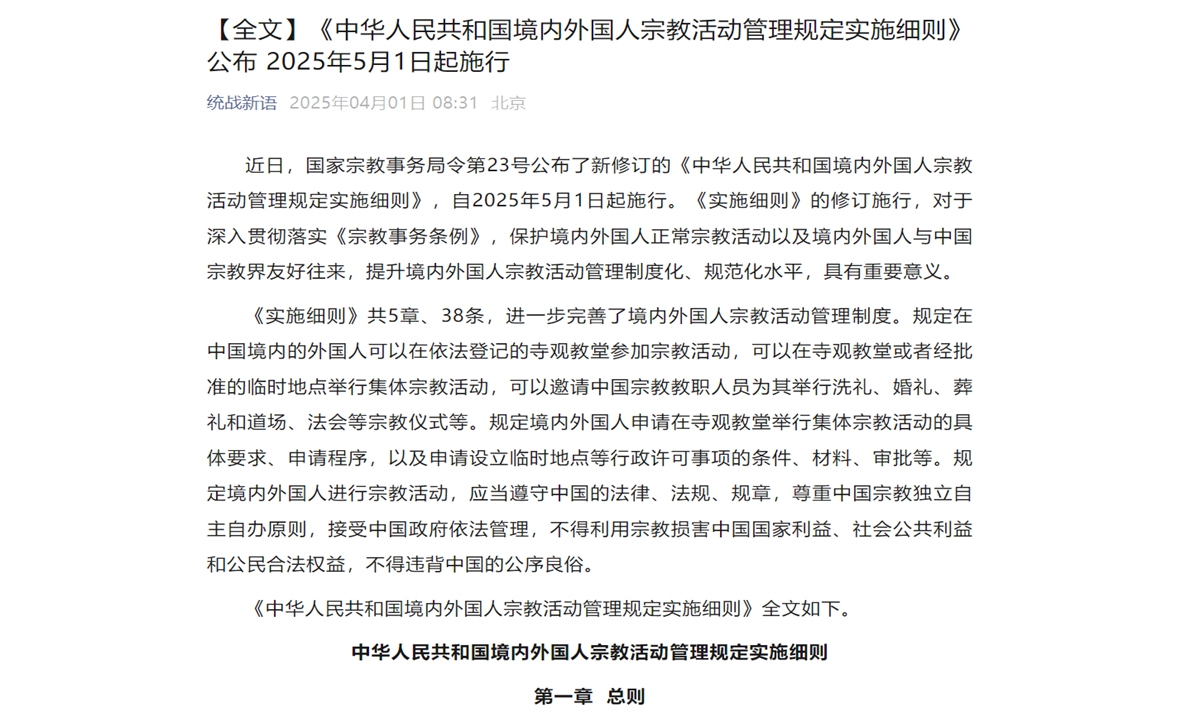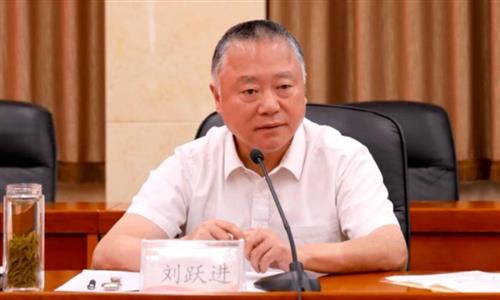China revises rules on foreigners' religious activities to strengthen regulation and exchanges

The WeChat account of Tongzhan Xinyu releases the full text of the revised Rules for the Implementation of the Provisions on the Administration of Religious Activities of Aliens within the Territory of the People's Republic of China on April 1, 2025. Photo: Screenshot of the WeChat account of Tongzhan Xinyu
China's State Administration for Religious Affairs recently announced the revised Rules for the Implementation of the Provisions on the Administration of Religious Activities of Aliens within the Territory of the People's Republic of China to regulate foreigners' religious activities, promote exchanges, and enhance oversight, according to WeChat account of Tongzhan Xinyu on Tuesday.
Tongzhan Xinyu belongs to the publicity department of the United Front Work Department of the CPC Central Committee.
The updated regulation, comprising five chapters and 38 articles, covers collective religious activities by foreigners, religious exchanges, and legal responsibilities. It will take effect on May 1, 2025.
Replying to media queries, an official from the State Administration for Religious Affairs noted that some foreigners have engaged in illegal preaching and religious activities, affecting religious harmony and social stability. Both domestic religious groups and foreign nationals had called for clearer guidelines. The revision aligns with legal administration requirements, specifying conditions, procedures, and time limits for administrative approvals, said the official, according to Tongzhan Xinyu.
The State Administration for Religious Affairs said the revision was urgently needed to regulate foreigners' religious activities in China. With China's further opening-up, the number of foreigners coming for business, tourism, and visits has increased, leading to a growing demand for religious activities. The previous rules needed improvement, especially in regulating collective religious activities.
The previous rules required further clarification on four administrative approvals, the official said, highlighting the need to revise the rules to specify relevant regulations and standardize the administrative approval process for religious affairs departments.
When asked about the newly revised provisions on foreign religious activities in China, the official stated that the revised rules reaffirm China's respect for foreigners' religious freedom and the legal protection of their religious activities.
The official noted that foreigners in China may engage in a wide range of religious activities at registered temples, mosques, and churches; They can hold collective religious activities at these sites or approved temporary locations and invite Chinese clergy to conduct religious ceremonies such as baptisms, weddings, and funerals with the consent of local religious groups; They may engage in religious and cultural exchanges with Chinese religious organizations, institutions, and venues; and, if invited, foreign clergy may preach at registered religious sites, and foreigners can study or teach at religious schools in China with the required approvals.
On collective religious activities, the official explained that foreigners can either hold special sessions at registered temples, mosques, or churches, or, if such arrangements are not feasible, apply to hold gatherings at approved temporary sites. The official also explained the procedural requirements for submitting a written application to hold collective religious activities at registered religious sites.
The official acknowledged that some foreigners do not comply with Chinese laws and regulations, engaging in illegal religious activities and unauthorized missionary work in China. The implementation rules explicitly state that foreigners conducting religious activities in China must abide by Chinese laws, respect the principle of religious independence and self-governance, and accept government supervision. They are prohibited from using religion to undermine China's national interests, public welfare, citizens' legal rights, or social norms.
Foreigners in China are prohibited from engaging in 11 specific religious activities, the official added, which include interfering in or controlling the affairs of Chinese religious organizations, institutions, and venues, as well as the recognition and management of religious clergy. Other prohibited activities include promoting religious extremism, supporting or funding extremist or illegal religious activities, and using religion to undermine national unity, ethnic harmony, or social stability.
From the perspective of safeguarding national security and social stability, the revised Rules for the Implementation of the Provisions on the Administration of Religious Activities of Aliens within the Territory of the People's Republic of China are of great significance, Wang Jiang, deputy director of the Institute of China's Borderland Studies at Zhejiang Normal University, told the Global Times on Tuesday.
Religious extremism is often linked to violence and terrorism, posing a major threat to national security and public order while disturbing the normal religious landscape, Wang said. He highlighted that the clear prohibition on foreigners propagating extremist ideologies in China is a key step in preventing extremist infiltration and ensuring public safety and social stability.
Wang pointed out that the newly revised rules reflect the principle of governing the country according to law, as they not only uphold national security and social stability but also protect the legitimate rights and interests of normal religious activities.
"These regulations do not mean restricting foreigners' normal and legal religious activities," Wang said, further emphasizing that "on the contrary, such standardized management helps ensure the smooth conduct of lawful religious activities, prevents religious activities from being exploited by extremist forces or ill-intentioned external influences, and protects the rights and interests of legitimate religious groups and the broader community of believers."



